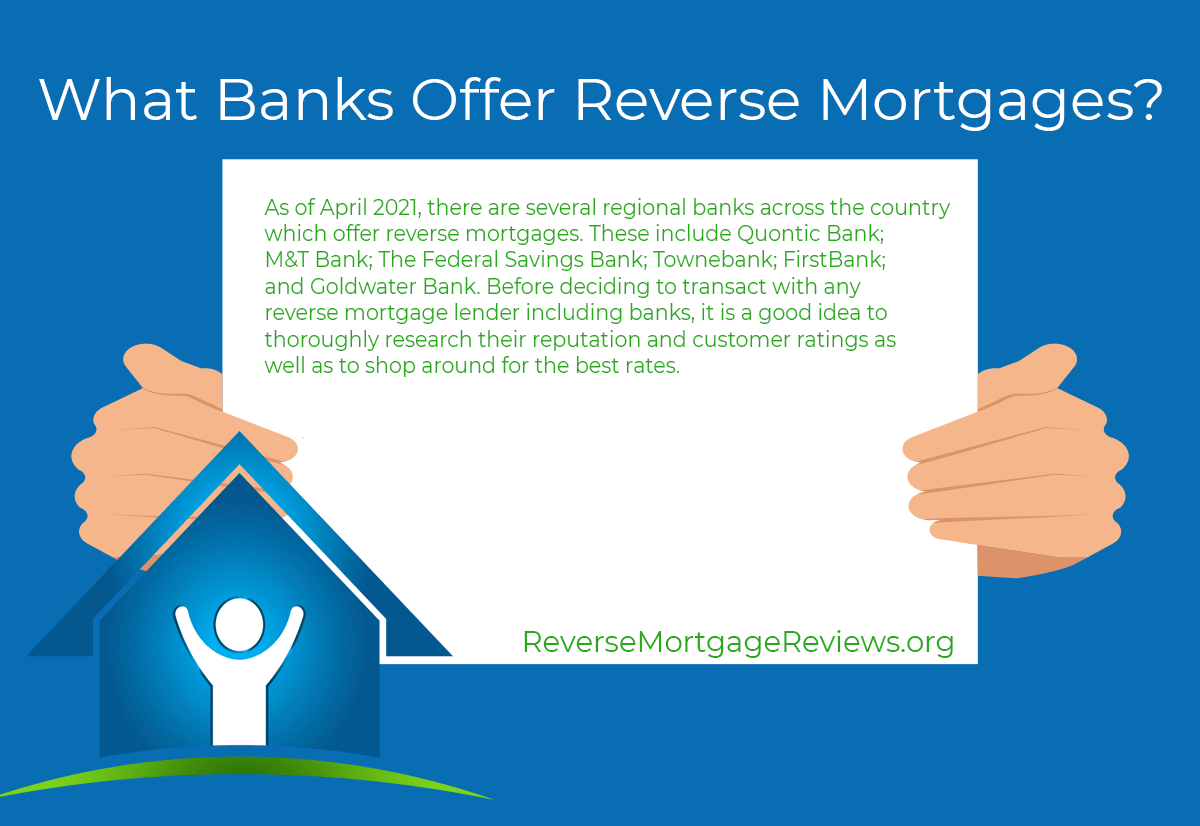6 Banks Offering Reverse Mortgages in 2025
Mike Branson Jr. – Author
Mike Branson Jr. has 25 years of experience in the mortgage banking industry. He has devoted the past 19 years to reverse mortgages exclusively. Mike has worked in several aspects of the Mortgage industry, including Loan Origination, Underwriting, and Management.If you have decided a reverse mortgage is right for you, you’ll naturally want to determine which lender to choose, especially regarding the most beneficial terms and associated costs.
One of the easiest things you can do is to go to the bank you already transact with for daily financial tasks to see if they offer reverse mortgages, but chances are that your bank may not offer such reverse mortgage loans to its senior customers.

Many internet searches may also yield inaccurate information concerning banks that may have offered reverse mortgages at one point but no longer do. For instance, major banks like Wells Fargo and Bank of America previously offered reverse mortgage loans but discontinued their offerings several years ago.
However, because of those banks’ ubiquity in American finance, searches may still associate those organizations with reverse mortgages. Still, some banks offer reverse mortgages today.
In this article, you will learn:
- The difference between banks and other lenders when it comes to reverse mortgages
- Which banks offer reverse mortgages
- Why some big banks exited the reverse mortgage business
What is the difference between banks and other reverse mortgage lenders?
When asking which kind of institution someone should get a reverse mortgage from, one natural question that may arise is whether a bank offering such a loan has any material advantage over other kinds of reverse mortgage lenders that exist.
The truth is, though, that there is not an abundance of difference between the kind of reverse mortgage you can get at some banks that offer them and other dedicated reverse mortgage lenders except for the staff that you would deal with, as well as the possibility that a bank has its private version of a traditional reverse mortgage product.
As of early 2021, no bank in the United States offers its own proprietary reverse mortgage product. The banks that participate in offering reverse mortgages instead offer the traditional Federal Housing Administration (FHA)-sponsored version of the reverse mortgage, which is called a “Home Equity Conversion Mortgage (HECM).”
So, in the end, there is no real difference between the kind of reverse mortgage you could get at a bank or the kind you can get from another lender. If you own a higher-value home and need a proprietary reverse mortgage with a higher lending limit than the HECM’s $1,149,825, you may have fewer reverse mortgage options at a bank when compared with a dedicated reverse mortgage lender.
On top of this, because FHA sponsors and insures most reverse mortgage loans, there is no material difference between getting such a loan from a bank or a non-bank lender or broker. Banks also have different regulations they must conform to when compared with non-banks, both at the federal and state levels.
Which banks offer reverse mortgages?
As of October 2025, several regional banks nationwide offer reverse mortgages. These include Quontic Bank, M&T Bank, The Federal Savings Bank, Townebank, FirstBank, and Goldwater Bank. Before deciding to transact with any reverse mortgage lender, including banks, it is a good idea to thoroughly research their reputation and customer ratings and shop around for the best rates.
Until late 2019, an additional bank called Resolute Bank offered reverse mortgages to customers nationwide. Still, they exited the reverse mortgage industry only days before they were forced to close by the Federal Deposit Insurance Corporation (FDIC). All depositors at Resolute were moved to another banking institution, and that successor bank does not offer reverse mortgages.
Why did the big banks get out of the reverse mortgage business?
There is no single reason that big banks like Bank of America and Wells Fargo decided to exit the reverse mortgage business. One reason may be that reverse mortgages are highly regulated by the federal government, which may have added to the difficulty for larger, less-focused institutions to hold onto the reverse mortgage business.
Many of the central banks that exited the reverse mortgage industry did so only a few years after the recovery from the 2008-2009 financial crisis began in earnest, which may have caused banks to look harder at the products and services they offered.
Another reason may be that because a big bank’s focus will naturally be on more conventional products that serve large numbers of people, they just decided to focus their efforts on more traditional offerings.
It is also possible that the government’s lack of financial assessment requirements may have made larger banks reluctant to be involved in the industry. However, financial assessment requirements were introduced into the reverse mortgage industry in 2015.
Big banks have not returned to offering reverse mortgages since then, however. Ultimately, the type of lender you choose is a personal decision, and you will find many options among smaller banks that offer the loans or dedicated reverse mortgage lenders or brokers.
Summary
To learn more about how a HECM loan might be right for you, contact one of our Top Reverse Mortgage Lenders or check your eligibility with our free reverse mortgage calculator.
|
No Comments on “6 Banks Offering Reverse Mortgages in 2025”
|

